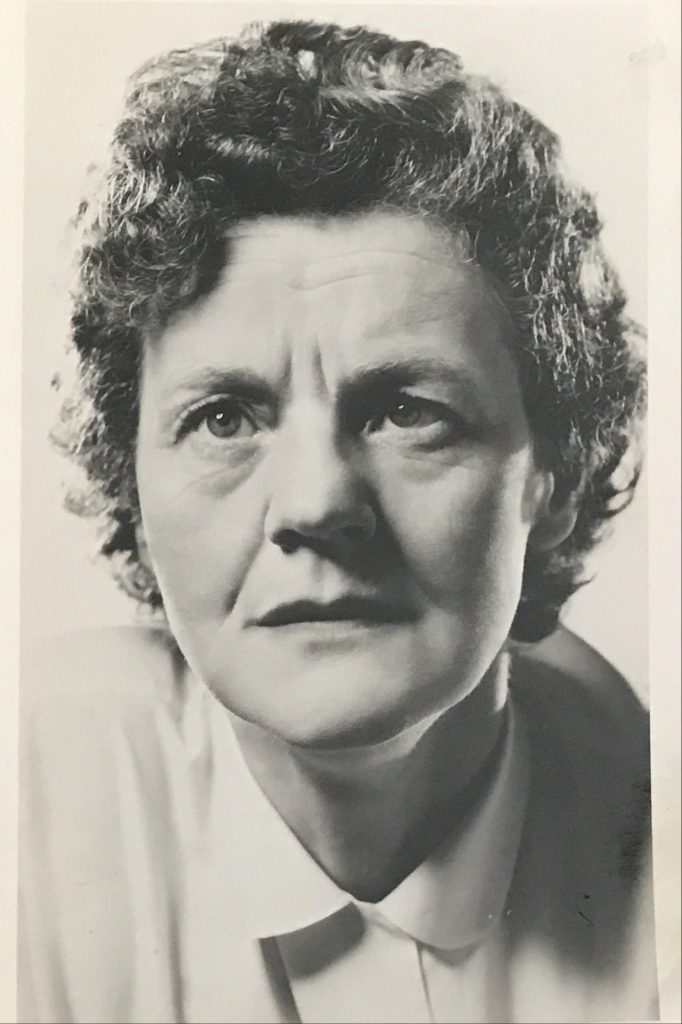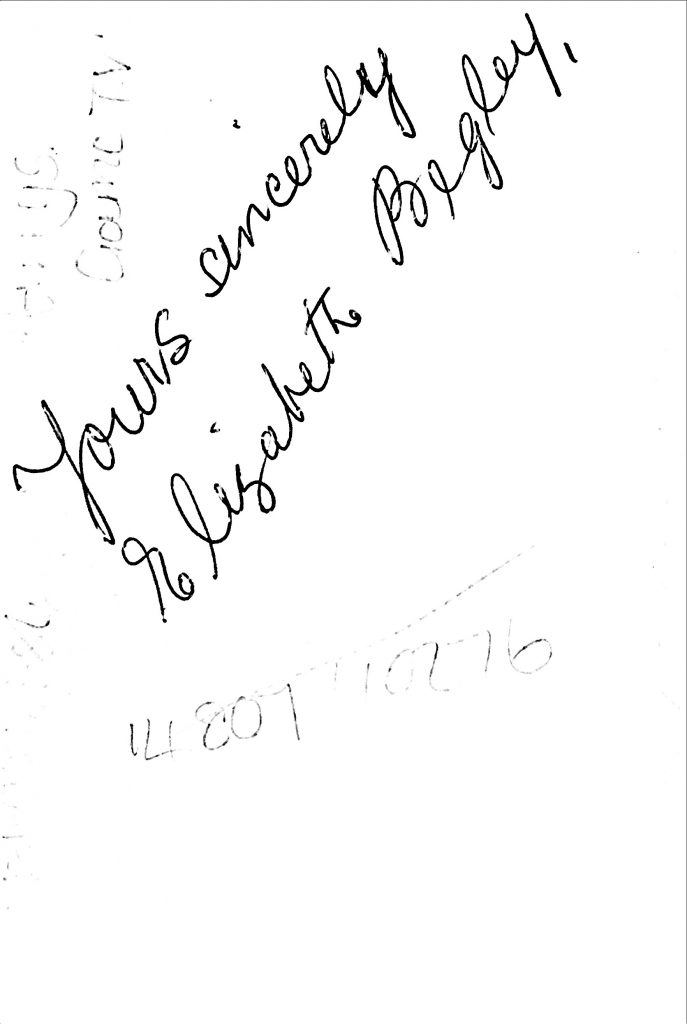
Elizabeth Begley was born in 1907 in Belfast. Her film debut was in “Sons and Lovers” in 1960. Her other movies include “The Leather Boys” and “!The Outsider”. She had an extensive television career and of particular note is “Harry’s Game” in 1982. She died in 1993.
“Ulster Actors” website entry:
Authoritative and naturally gifted actor of both stage and screen renown, who for almost twenty years was the indesputable Grande Dame of Ulster Theatre and was at the centre of the hugely productive coterie at large in the Group Theatre Belfast from 1940 to 1959.
Before that she was an occasional member of Richard Hayward’s Belfast Repertory Theatre, appearing in two Hugh Quinn plays at the Gaiety Theatre, Dublin in 1937, taking the snugly fit role, despite her thirty years, of the Widow McKeown in ‘A Quiet Twelfth’ and later was Miss Shiels in the Falls Road set ‘Collecting The Rent’. In 1938, she joined the newly formed Northern Ireland, Irish Players, which included Joseph Tomelty and Beatrice Duffell amongst it’s numbers and appeared at the Empire Theatre, Belfast in two early offerings presented in June 1939, Somerset Maugham’s ‘The Letter’ and Tomelty’s restructured ‘Barnum Was Right’, originally entitled ‘The Beauty Competition’.
During the forties she built a formidable reputation as a virtuoso character actor with the Group Players in productions such as Joseph Tomelty’s wartime Belfast set ‘Poor Errand’ and his black comedy, the retitled ’Right Again Barnum’, both 1943 and Patricia O’Connor’s ‘Select Vestry’ 1945.
In the latter half of the decade she took leading roles in many praiseworthy Group presentations, including Harry Sinton Gibson’s ‘Bannister’s Cafe’, featuring a young Patrick Magee, Cecil Cree’s ‘A Title For Buxey’ and Tomelty’s masterwork ‘All Soul’s Night’, all 1949.
Her reputation by this stage was now as big as her repertoire and she saw in the new decade with highly tuned central performances in plays as diverse as Sinton-Gibson’s family at war drama, ‘The Square Peg’ 1950 and the J.R.Mageean/Ruddick Millar quasi-farce ‘Arty’ 1951.
These were heady days indeed for the Group Players, whose nucleus comprised of the most proficient actors then available in Northern Ireland.
The early fifties proved equally as fertile and she endorsed her Queen Of Ulster Theatre status with majesterial characterizations, appearing as Teresa in Patrick Riddell’s ‘The House Of Mallon’1952, as Mrs Connor in Michael J. Murphy’s drama ‘Dust Under Our Feet’ 1953 and as Marona in Joseph Tomelty’s ‘Is The Priest At Home?’ 1954.
Now vital to the fortunes of the Group Players, she commanded an elevated credit rating in virtually every production she chose to appear in, during what was incredulously the final years of the company.
Memorable performances included her Martha Gomartin in ‘That Woman At Rathard’, Sam Hanna Bell’s adaptation of his novel ‘December Bride’ and the mother Agnes Mahaffy, with Margaret D’Arcy in the title role of St John Greer Ervine’s potent melodrama ‘Martha’, both 1955.
In 1958, an intimation as to the future of the Group as a bona-fide repertory venue was severely tested when writer Gerald McLarnon’s eve of ‘The Twelfth’ observational piece ‘The Bonfire’, was forced to transfer to the Grand Opera House.
It’s perceived politically sensitive content alarmed certain members of an illiberal Board Of Directors and due to the attendant brouhaha, the play perhaps enjoyed more success than it otherwise merited, but did boast an illustrious cast, with Begley herself, James Ellis and Colin Blakely in prominent roles.
The following year the Group’s administrative hierarchy faced another examination, one which would create an artistic impasse too intractable to overcome.
The well documented ‘Over The Bridge’ incident resulted in the disintegration of the Group Players and Begley, who due to other commitments was not in the cast of Sam Thompson’s veritable classic which premiered at the Empire Theatre Belfast in January 1960, saw the door close on a momentous twenty year chapter in her professional life.
A new career on-screen awaited and she was quickly off the mark, making two television appearances in as many months at the end of 1959, with choice roles in ‘Armchair Theatre’ plays, an eye catching debut in ‘Worm In The Bud’ and a masterclass pairing with J.G.Devlin in Tomelty’s ‘A Shilling For The Evil Day’, screened by UTV the day after the official launch of the station on October 31st.
In the early years of the 1960′s she found no shortage of work, particularly on the small screen, where between 1960/62 she guested in several plays and series and included her first film role, an assured little cameo as Mrs Radford in director Jack Cardiff’s estimable interpretation of D.H.Lawrence’s ‘Sons And Lovers’ 1960.
On television she had a high level of exposure on many top rated shows of the day, such as ‘Z Cars’ 1962, ‘No Hiding Place’ 1963 and ‘The Plane Makers’ 1964, ensuring her future, for the short term at the very least, in a rapidly evolving medium.
Notable among small screen successes in the mid to late sixties was her role as Unionist politician’s wife Ethel Kerr in Sam Thompson’s ‘Cemented With Love’ 1965, which also courted controversy, but mercifully was eventually screened intact, with J.G.Devlin and Harold Goldblatt heading a strong cast.
Sadly Sam Thompson died just weeks before broadcast, but no doubt would have been satisfied that common sense ultimately prevailed.
In the seventies there was little change to her television schedule, with a relentless run of co-starring roles during a two year period, the best of which was arguably Dominic Behan’s Home Rule inspired teleplay ‘Carson’s Country’ 1972, in which she featured prominently in a cast including an inevitable J.G.Devlin, Harry Towb and Sam Kydd.
From that point her routine followed the familiar sixties template of guest starring roles in popular television series and the periodic play, with the exception of a regular appearance as Bridget McCarthy in the 1976 urban social drama ‘The Crezz’.
She marked her sixth decade as a professional actor, playing a subsidiary part in writer/director Tony Luraschi’s IRA infused film drama, ‘The Outsider’ 1980 and two years later aged seventy five, she played her final role, a stock-in-trade portrayal as Mrs Duncan in the much lauded ‘Harry’s Game’ 1982.
Elizabeth Begley was undoubtedly one of the most prolific actors to emerge from what is regarded as the golden age of Ulster theatre, a redoubtable and highly efficient player who later brought her guile and and composure to a much wider square- eyed audience.
The above “Ulster ctors” entry can also be accessed online here.


